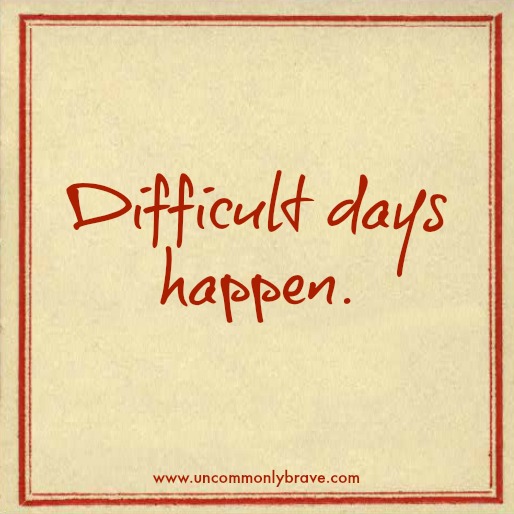
If you don’t have a chronic illness, if you’re not the one with a rare disease, if you don’t have an invisible illness, then you likely won’t relate to what I’m about to say. But I hope you’ll listen. I want to tell you that when you have a chronic illness…difficult days happen.
People with chronic illness might be jumping and running, laughing and playing one day. Then the next be at home in bed feeling like they got run over by a truck. Your child might feel fine one minute, and the next be struggling with an incredible amount of pain. Your friend, who was perky when she arrived at your party, might feel like the world is spinning by the time she leaves. Or your wife might be fine one week, but really struggle to contribute in any way to the household the next. That’s because…
Difficult days happen!
No one in the chronic illness community wants to experience a difficult day. Yet, we all know these days are destined to come. Why do they hit? Maybe because we overdid it the night before. Maybe because the seasons are changing. Maybe because the man who lives down the street has a hangnail today. (Okay, that’s not a real reason…but you get the idea.) Occasionally difficult days happen because we chose to use our energy on something that was really important to us the night before. Sometimes they happen because our environment is out of whack. Other times, who knows why they happen? But they do.
As someone with a chronic illness, I would like people around me to understand that I want to be cautious with my energy on the good days (to make sure I keep a reserve), and at the same time I want to have a good time. And I want them to know that I need a bit more space and compassion on the bad days, because on those days I’m working extra hard to just maintain.
During my healthcare journey, I attended a program for people with chronic pain and illness in which we were encouraged to have a difficult day plan. We could put this plan in writing or make it a verbal agreement with the family. But the plan needed to include the things we would continue to do, start to do or stop doing when the times were difficult. For some, exercising (maybe at a lower intensity) is still important on a difficult day. For others stopping all activity is what needs to happen. Some people need to watch a funny television show or movie to get the endorphins going. Others need to have time to meditate or stretch. We each just need to know (or explore) what works for us.
If you’re trying to support someone with a chronic illness, find out what works the best for them. Then you know how to help (even without being asked) when the day is hard. And if you’re someone with a chronic illness, make a difficult day plan. Choose ahead of time what you think will help distract you from the pain and illness. And choose two or three healthy activities you could participate in to help you recover some strength. (Me…for the really bad days, I have a few television shows I wait to watch on Netflix so I can do an occasional difficult-day-marathon. And I try to get up, get showered and do as many normal things as I possibly can. I also use these days to pray and meditate.) Each plan will look as varied as the individual…but it helps to have it in mind. That way when the difficult days come, you have already decided how you’re going to react.
Difficult days happen. What’s your plan?
